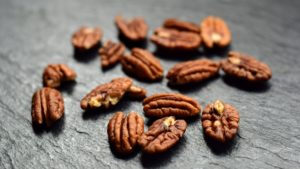Written by Jessica Patella, ND. Study results show supplementing the diet with pecans or adding pecans to the diet can help improve multiple blood cholesterol levels.
 Elevated cholesterol levels are a major risk factor for heart disease and stroke 1. The World Health Organization estimates elevated cholesterol levels cause 2.6 million deaths per year and an estimated 39% of adults worldwide have elevated cholesterol levels 1. Nuts have been shown to be cardioprotective 2, but very little research has evaluated pecans on cholesterol levels. New research has found pecans can help improve blood cholesterol levels 2.
Elevated cholesterol levels are a major risk factor for heart disease and stroke 1. The World Health Organization estimates elevated cholesterol levels cause 2.6 million deaths per year and an estimated 39% of adults worldwide have elevated cholesterol levels 1. Nuts have been shown to be cardioprotective 2, but very little research has evaluated pecans on cholesterol levels. New research has found pecans can help improve blood cholesterol levels 2.
One dietary modification for improving cholesterol profiles is to replace saturated fatty acids and trans-fat with unsaturated fatty acids 3. This has had positive benefits by increasing unsaturated fatty acid intake by increasing nut consumption 4-6. To this point most research has studied walnuts, almonds or pistachios, this study is one of the first to investigate the effects of pecans 2.
The recent research included 56 sedentary adults with either high cholesterol or a BMI (Body Mass Index) greater than or equal to 28. Participants were then randomized to one of three groups: Control group (no nuts, n=20), ADD group (n=17) where 68 grams (about ½ a cup or 2.25 ounces) of pecans per day were added to the diet, or the SUB group (n=19) where 68 grams of pecans per day were substituted for isocaloric foods (about 475 kcalories) from the participants normal eating habits. This was then followed for 8-weeks and participants had to log their pecan intake daily on a document, which was submitted weekly.
The results were as follows:
| Baseline | 8-weeks | |
|---|---|---|
| Total Cholesterol (mg/dL) ADD | 204 +/- 8.76 | 195 +/- 8.12 |
| Total Cholesterol (mg/dL) SUB | 205 +/- 8.06 | 195 +/- 6.94 |
| Total Cholesterol (mg/dL) Control | 202 +/- 43.6 | 208 +/- 47.8 |
| LDL (mg/dL) ADD | 143 +/- 8.09 | 129 +/- 7.71 |
| LDL (mg/dL) SUB | 144 +/- 6.60 | 135 +/- 6.16 |
| LDL (mg/dL) Control | 141 +/- 43.5 | 148 +/- 39.3 |
| Triglycerides (mg/dL) ADD | 139 +/- 12.1 | 125 +/- 14.6 |
| Triglycerides (mg/dL) SUB | 133 +/- 10.7 | 120 +/- 10.3 |
| Triglycerides (mg/dL) Control | 131 +/- 39.1 | 158 +/- 83.9 |
| Non-HDL cholesterol (mg/dL) ADD | 151 +/- 8.24 | 140 +/- 7.95 |
| Non-HDL cholesterol (mg/dL) SUB | 155 +/- 6.87 | 143 +/- 6.00 |
| Non-HDL cholesterol (mg/dL) Control | 150 +/- 43.1 | 157 +/- 45.5 |
| Apolipoprotein B (mg/dL) ADD | 99.1 +/- 5.96 | 93.0 +/- 5.35 |
| Apolipoprotein B (mg/dL) SUB | 104 +/- 3.43 | 97.1 +/- 3.11 |
| Apolipoprotein B (mg/dL) Control | 96.9 +/- 25.4 | 103 +/- 23.2 |
*All results (P< or equal to 0.05), with no significant changes in the control group.
In conclusion, these results show supplementing the diet with pecans or adding pecans to the diet can help improve multiple blood cholesterol levels. Researchers point out the clinical significance of the improvement in LDL cholesterol levels could correspond to a 6.5-11.4% reduction in the risk for coronary artery disease 2. They suggest consuming pecans is a simple and low-cost method to reduce cardiovascular risk factors and future research should investigate a longer duration and different amounts of pecans 2.
Source: Guarneiri, Liana L., Chad M. Paton, and Jamie A. Cooper. “Pecan-Enriched Diets Alter Cholesterol Profiles and Triglycerides in Adults at Risk for Cardiovascular Disease in a Randomized, Controlled Trial.” The Journal of Nutrition 151, no. 10 (2021): 3091-3101.
© The Author(s) 2021. Published by Oxford University Press on behalf of the American Society for Nutrition. All rights reserved.
Click here to read the full text study.
Posted November 16, 2021.
References:
- WHO. Raised Cholesterol. Accessed October 22, 2021, https://www.who.int/data/gho/indicator-metadata-registry/imr-details/3236
- Guarneiri LL, Paton CM, Cooper JA. Pecan-Enriched Diets Alter Cholesterol Profiles and Triglycerides in Adults at Risk for Cardiovascular Disease in a Randomized, Controlled Trial. J Nutr. Oct 1 2021;151(10):3091-3101. doi:10.1093/jn/nxab248
- USDA. Dietary Guidelines for Americans 2015–2020. May 13, 2019. 2021. https://health.gov/dietaryguidelines/2015/guidelines/
- Ros E, Núñez I, Pérez-Heras A, et al. A walnut diet improves endothelial function in hypercholesterolemic subjects: a randomized crossover trial. Circulation. Apr 6 2004;109(13):1609-14. doi:10.1161/01.Cir.0000124477.91474.Ff
- Njike VY, Ayettey R, Petraro P, Treu JA, Katz DL. Walnut ingestion in adults at risk for diabetes: effects on body composition, diet quality, and cardiac risk measures. BMJ open diabetes research & care. 2015;3(1):e000115. doi:10.1136/bmjdrc-2015-000115
- Torabian S, Haddad E, Cordero-MacIntyre Z, Tanzman J, Fernandez ML, Sabate J. Long-term walnut supplementation without dietary advice induces favorable serum lipid changes in free-living individuals. Eur J Clin Nutr. Mar 2010;64(3):274-9. doi:10.1038/ejcn.2009.152

